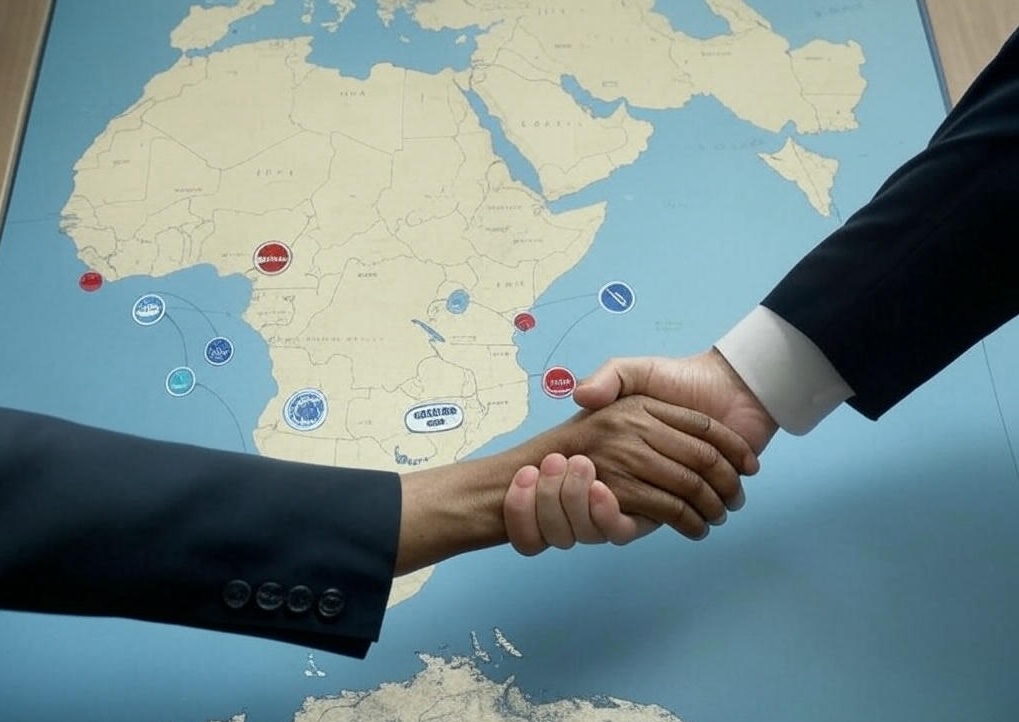Long-Term Shifts in Global Partnerships and U.S.-Africa Relations
Observations By Ceaser Siwale
The USAID pullback is not just a funding issue – it also signals a shift in geopolitical relationships. U.S.-Africa relations are poised to change. For decades, foreign aid was a pillar of American “soft power” in Africa, a way to project influence and goodwill. Now that pillar is crumbling. African governments and citizens may increasingly question the reliability of the U.S. as a development partner. Trust and goodwill earned over years of cooperation risk being lost. As one humanitarian leader noted, this sudden retreat by the U.S. is effectively ceding influence in Africa to other global powers like China, Russia, and even regional players such as Iran. In other words, when America steps back, others are ready to step in.

Importantly, what’s happening with U.S. aid is part of a broader trend among Western donors. Several European countries are also slashing aid budgets under domestic pressure. The United Kingdom, for example, cut its foreign aid by 40% in recent years to redirect funds to defense. France’s government has planned to trim over a third of its aid budget, and Germany has been tightening its aid spending as well. Rich nations face their own fiscal strains (from pandemic debts, economic slowdowns, and the costs of the war in Ukraine) and are prioritizing domestic and security needs over foreign assistance. This means African nations cannot simply turn to Europe or other Western countries to fill the gap left by USAID – the entire Western aid model is retrenching. We are likely entering a more “parsimonious era of aid” globally, where donations are smaller and more selective.
In response, African countries are looking to new partners or expanding ties with old ones that were previously secondary. The most prominent alternative partner is China. Over the past two decades, China has become Africa’s largest trading partner and a major source of loans and investment in infrastructure (through initiatives like the Belt and Road). Beijing has generally focused on financing roads, railways, ports, power plants, and telecom networks – tangible projects that align with its interests – rather than on humanitarian aid or governance programs. As Western aid recedes, many African governments may deepen their engagement with China to fund development projects. Indeed, China has shown willingness to invest where others won’t: for example, it has funded industrial parks in Ethiopia, high-speed rail in Kenya, and even space programs in countries like Egypt. However, Chinese support often comes as loans or business deals, not grants – and it is driven by China’s strategic and economic aims. Analysts caution that Beijing is “unlikely to fill the gap” in areas like health or education that don’t yield immediate returns. China’s aid and investment are tied to its own interests (securing natural resources, winning contracts for Chinese firms, and gaining diplomatic allies). So while China’s role in Africa will certainly grow, it may not replace the lost humanitarian functions of USAID.
Russia is another player courting Africa. Russia’s involvement has been more political and security-oriented – providing military training, arms, or mercenaries (such as the Wagner group) to certain governments, and securing mining concessions in return. Moscow has ramped up its diplomatic outreach, hosting regular Russia-Africa summits and pledging things like free grain shipments to African countries (as it did after withdrawing from the Ukraine grain export deal). With fewer strings attached to its partnerships, Russia markets itself as a friend who won’t lecture on governance. A few African nations facing Western criticism (like Mali or Sudan) have gravitated toward Russian support. Still, Russia’s capacity is limited compared to China or the West; its economy is relatively small, and it offers little in terms of development finance beyond strategic sectors (energy, minerals, arms). But Africa might seek Russian deals in mining or energy if Western companies pull out. For instance, Russian firms are involved in diamond mining in Central Africa and nuclear energy talks with countries like Egypt. As U.S. influence wanes, Russia sees an opening to expand its footprint, though mostly in a handful of countries where it has specific interests.
The Gulf states of the Middle East – especially the wealthy members of the Gulf Cooperation Council (GCC) like Saudi Arabia, the UAE, and Qatar – are increasingly important partners for Africa as well. Gulf countries have invested over $100 billion in Africa in the last decade, spanning sectors from real estate and tourism to ports and agriculture. Their motives include securing food supplies (Gulf nations import most of their food and have leased large farmlands in Sudan, Ethiopia, and beyond), diversifying their economies, and gaining political influence. Drops in oil prices have even led the Gulf states to look at critical minerals in Africa as new investment opportunities, since they need minerals like cobalt and lithium for the global energy transition. We can expect Gulf investors and sovereign wealth funds to step up their involvement in African infrastructure, mining, and finance as Western public aid declines. For African countries, the GCC offers deep pockets and a different style of partnership – often more business-like, with fewer political conditions. For example, the UAE and Saudi Arabia have financed major port projects in East Africa and are partnering with nations like Kenya, Tanzania, and Senegal to develop logistical hubs. The Gulf states are also boosting their soft power: hosting Africa summits, mediating in African conflicts, and increasing labor opportunities for African migrant workers. These relationships were growing even before the USAID cuts, but now African leaders might lean on them more heavily for investment and emergency funding.

India is another emerging partner to consider. While not as dominant as China, India has historic ties to many African countries (through diaspora communities and the Non-Aligned Movement). India’s government has extended lines of credit for African infrastructure and offered training programs in areas like IT and medicine. Indian companies are active in African telecommunications, pharmaceuticals, and manufacturing. With Western aid shrinking, countries may seek more South-South cooperation – and India, touting itself as a fellow developing nation that lifted millions from poverty, often pitches partnership based on shared experience. In recent years, India-Africa trade and investment have grown, and India has hosted Africa forums to deepen ties. Likewise, Turkey, Brazil, and others are also courting Africa. The net effect is a diversification: African states are not putting all their eggs in one basket but rather engaging a range of global players for diplomatic and economic support.
For the United States and Europe, these shifts raise strategic concerns. Western officials worry that diminished engagement in Africa will translate to loss of influence and competitiveness on the continent. Issues like counterterrorism, migration, and global health (which benefit from stable African partners) could become harder to manage if relations fray. As one U.S. foreign policy advocate noted, “What will be lost – on counterterror, global health, food security, and competition – [is significant]”. In essence, the retreat of aid might make the U.S. and Europe less secure and less economically connected to Africa in the long run. It could also push African nations closer to China’s and Russia’s orbits in international forums, potentially undermining Western positions on global issues. The balance of power in Africa is tilting toward a more multipolar scenario: Africa will engage with whoever offers the best deal, be it East or West. This could empower African countries to play suitors off each other to some extent. But it also means Western nations will have to find new bases for relations with Africa – likely shifting from an aid-dominated relationship to one centered on trade, investment, and mutual interests.
